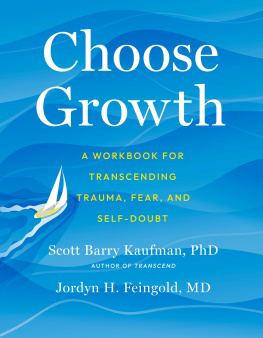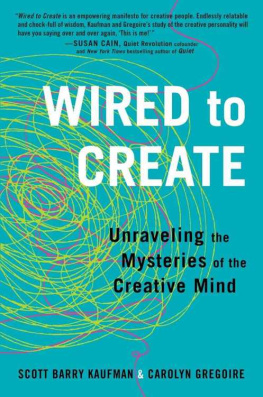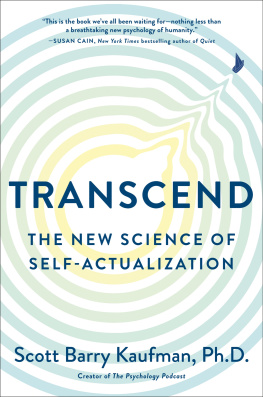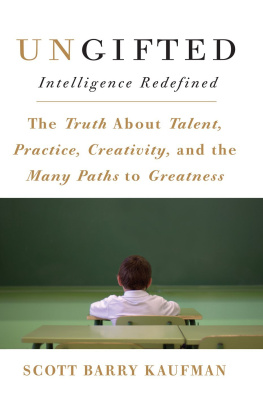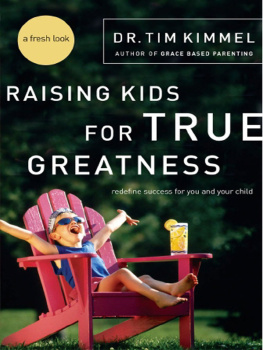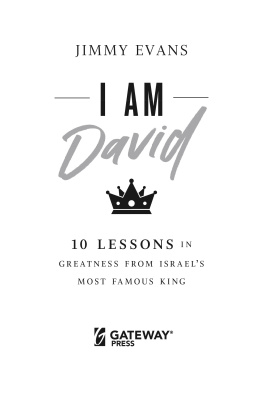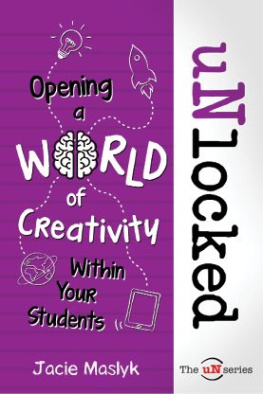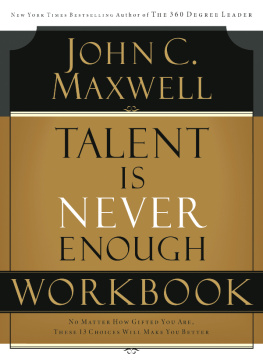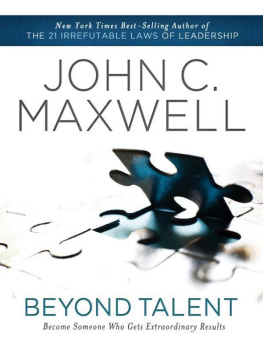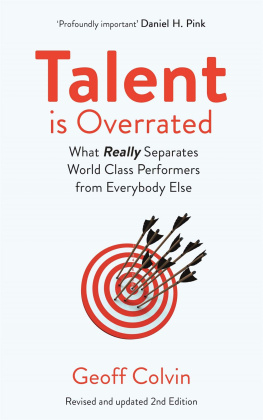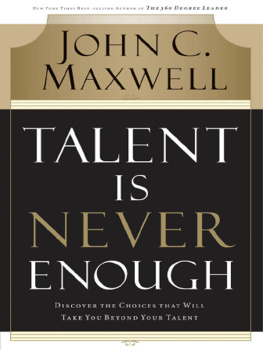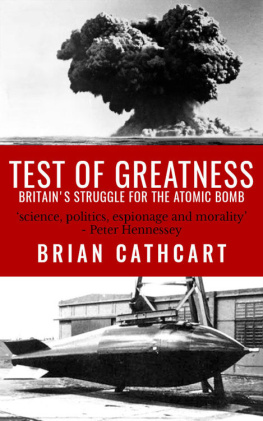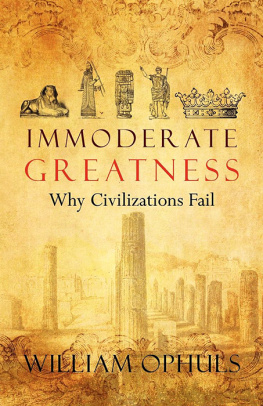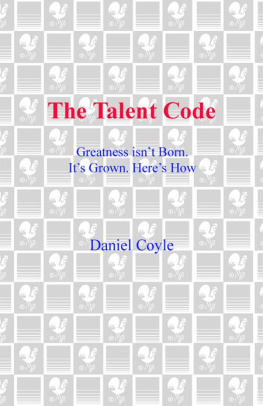The Complexity of Greatness
The Complexity
of Greatness
Beyond Talent or Practice
Edited by Scott Barry Kaufman


Oxford University Press is a department of the University of Oxford.
It furthers the Universitys objective of excellence in research, scholarship,
and education by publishing worldwide.
Oxford New York
Auckland Cape Town Dar es Salaam Hong Kong Karachi
Kuala Lumpur Madrid Melbourne Mexico City Nairobi
New Delhi Shanghai Taipei Toronto
With offices in
Argentina Austria Brazil Chile Czech Republic France Greece
Guatemala Hungary Italy Japan Poland Portugal Singapore
South Korea Switzerland Thailand Turkey Ukraine Vietnam
Oxford is a registered trademark of Oxford University Press in the UK and certain other
countries.
Published in the United States of America by
Oxford University Press
198 Madison Avenue, New York, NY 10016
Oxford University Press 2013
All rights reserved. No part of this publication may be reproduced, stored in a
retrieval system, or transmitted, in any form or by any means, without the prior
permission in writing of Oxford University Press, or as expressly permitted by law,
by license, or under terms agreed with the appropriate reproduction rights organization.
Inquiries concerning reproduction outside the scope of the above should be sent to the Rights
Department, Oxford University Press, at the address above.
You must not circulate this work in any other form
and you must impose this same condition on any acquirer.
Library of Congress Cataloging-in-Publication Data The complexity of greatness : beyond talent or practice / edited by Scott Barry Kaufman.
pages cm
Includes bibliographical references and index.
ISBN 9780199794003
1. Ability. 2. Gifted persons. 3. Intelligence levels. I. Kaufman, Scott Barry, 1979
BF431.C596 2013
153.98dc23
2012040833
This book is dedicated to the fond memory of pioneering psychologist Michael Howean inspiration to many, and a fi ne example of greatness.
CONTENTS
Scott Barry Kaufman
Wendy Johnson
Dean Keith Simonton
Samuel D. Mandelman and Elena L. Grigorenko
Heiner Rindermann, Stephen J. Ceci, and Wendy M. Williams
James C. Kaufman, John Baer, and Lauren E. Skidmore
Martha J. Morelock
Darold A. Treffert
Paul A. OKeefe
K. Anders Ericsson, Roy W. Roring, and Kiruthiga Nandagopal
Franoys Gagn
K. Anders Ericsson
Gregory Feist
Linda E. Brody
John Wilding
Tony Noice and Helga Noice
Ellen Winner and Jennifer E. Drake
Jane Davidson and Robert Faulkner
Paul R. Ford, Nicola J. Hodges, and A. Mark Williams
Jane Davidson, John Sloboda, and Stephen Ceci
PREFACE
What is greatness and how do people get there? Is greatness born or made? Is greatness the result of talent or practice? Few other questions have caused such intense debate, controversy, and diversity of opinions. The heights of human accomplishment have always fascinated us, and for good reason. The striving for greatness is a fundamental human drive, and without it we would be bereft of some of our most valuable cultural products. How we conceptualize greatness and its developmental trajectory has important implications for education, business, and societywhich makes it all the more important that we make an effort to understand all the many complex, nuanced factors contributing to its emergence.
Greatness eludes precise definition, and historically it has been approached in different ways. In ancient times, greatness had spiritual connotations, and geniuses were viewed as divine. Kant thought talent was an integral ingredient of the emergence of greatness, as geniuses use their natural talents to produce something original and exemplary ().
Since the beginnxing of this debate, both extremes have been represented. Sir Joshua Reynolds, an influential 18th century British painter, warned his students at the Royal Academy that
You must have no dependence on your genius. If you have great talents, industry will improve them; if you have but moderate abilities, industry will supply their deficiency. Nothing is denied to well directed labour; nothing is to be obtained without it. Not to enter into metaphysical discussions on the nature or essence of genius, I will venture to assert, that assiduity unabated by difficulty, and a disposition eagerly directed to the object of its pursuit, will produce effects similar to those which some call the result of natural powers. ()
While it seemed everyone had an opinion, the topic started receiving scientific treatment with the publication of Francis Galtons Hereditary Genius in 1869. Based on his analysis of eminent lineages, Galton, who was Charles Darwins cousin and was greatly influenced by Darwins ideas, argued that genius is primarily born. While Galton acknowledged the importance of passion, zeal, and persistence, he argued that regardless of environment, those with exemplary natural abilities inevitably rise to the top (showed evidence for the importance of environmental factors, finding that eminent scientists from Western civilization tended to do their best work under particular political, economic, social, cultural, and religious circumstances. However, while de Candolles results showed the importance of environmental conditions on the average population, his data did little to explain individual differences within a population.
The early behaviorists, including B. F. Skinner and John Watson, emphasized conditioning. No doubt biased by his particular theoretical position on learning and behavior, Watson made the following bold claim:
Give me a dozen healthy infants, well-formed, and my own specified world to bring them up in, and Ill guarantee to take any one at random and train him to become any type of specialist I might selecta doctor, lawyer, artist, merchant-chief, and yes, even a beggar-man and thief, regardless of his talents, penchants, tendencies, abilities, vocations and race of his ancestors. I am going beyond my facts and I admit it, but so have the advocates of the contrary and they have been doing it for many thousands of years. ()
Regardless of the veracity of this bold assertion, at least Watson was honest that more data were needed on this topic! The advent of cognitive psychology brought an emphasis on expertise acquisition as the main factor underlying differences in elite performance. Nobel Prize laureate Herbert Simon and William Chase suggested that a decade of intense work and apprenticeship is required to become an expert in chess ().
While deliberate practice is certainly important, its unlikely to be the whole story. Even though the most cited and well-known philosophers and psychologists of all time were those who took extreme views on key debates of their time, including the naturenurture debate, more moderate, integrative stances are more likely to be correct (). Things are often not what they seem.
Take the practice side of the debate. Many studies looking at experts suffer from a restricted range: Those without the requisite abilities have already been weeded out of the competition, so those skills will no longer be predictive of performance. What happens when you look at a random selection of the population? While deliberate practice may be an important contributor to expertise, is it also sufficient to carry just anyone all the way to greatness? Dont some people invent a whole new path of deliberate practice for others to follow?


